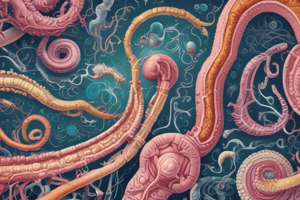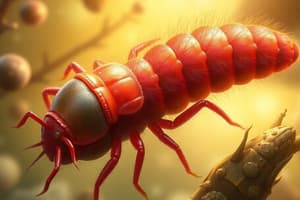Podcast
Questions and Answers
What is the most common mode of infection for Sparganosis?
What is the most common mode of infection for Sparganosis?
- Ingesting the procercoid in the first intermediate host (cyclops) when drinking contaminated water
- Ingesting the plerocercoid in second intermediate hosts such as frogs
- From poultices prepared from frogs infected with plerocercoids that are applied directly to ulcers, sores, and inflamed eyes
- All of the above (correct)
What is the most common clinical manifestation of Sparganosis in the eye?
What is the most common clinical manifestation of Sparganosis in the eye?
- Conjunctivitis (correct)
- Glaucoma
- Retinal detachment
- Periorbital edema
What is the most common treatment for Sparganosis?
What is the most common treatment for Sparganosis?
- Photocoagulation
- Antibiotics
- Surgical excision (correct)
- Cryotherapy
What is the larval stage of Taenia Multiceps?
What is the larval stage of Taenia Multiceps?
Which of the following is NOT a potential clinical manifestation of Sparganosis in the central nervous system (CNS)?
Which of the following is NOT a potential clinical manifestation of Sparganosis in the central nervous system (CNS)?
Which of the following is the most common mode of transmission for Coenuriasis?
Which of the following is the most common mode of transmission for Coenuriasis?
What is the most effective treatment for Coenuriasis?
What is the most effective treatment for Coenuriasis?
What is the definitive host for Taenia Multiceps?
What is the definitive host for Taenia Multiceps?
What is the most common cause of adult-onset epilepsy worldwide?
What is the most common cause of adult-onset epilepsy worldwide?
Which clinical manifestation is most commonly associated with neurocysticercosis?
Which clinical manifestation is most commonly associated with neurocysticercosis?
Which imaging technique is NOT typically used for diagnosing neurocysticercosis?
Which imaging technique is NOT typically used for diagnosing neurocysticercosis?
What treatment is used for symptomatic neurocysticercosis with seizures?
What treatment is used for symptomatic neurocysticercosis with seizures?
What is a common complication due to the death of cysticerci in neurocysticercosis?
What is a common complication due to the death of cysticerci in neurocysticercosis?
In the treatment of neurocysticercosis, which medication is generally used?
In the treatment of neurocysticercosis, which medication is generally used?
Which of the following is a symptom related to spinal cysticercosis?
Which of the following is a symptom related to spinal cysticercosis?
Which diagnostic method is utilized to identify subcutaneous lesions in cysticercosis?
Which diagnostic method is utilized to identify subcutaneous lesions in cysticercosis?
What is the primary cause of cysticercosis in humans?
What is the primary cause of cysticercosis in humans?
Which of the following best describes the relationship of humans in the life cycle of Taenia solium?
Which of the following best describes the relationship of humans in the life cycle of Taenia solium?
Which condition is NOT recognized as a zoonotic disease involving human cysts?
Which condition is NOT recognized as a zoonotic disease involving human cysts?
Which organs can be affected by hydatid disease?
Which organs can be affected by hydatid disease?
What role do laboratory investigations play in managing tissue cystodes?
What role do laboratory investigations play in managing tissue cystodes?
What is a common source of infection that can lead to cysticercosis in humans?
What is a common source of infection that can lead to cysticercosis in humans?
Which of the following is NOT a preventive measure for tissue cestode infections?
Which of the following is NOT a preventive measure for tissue cestode infections?
What is the mechanism behind cyst development in cysticercosis?
What is the mechanism behind cyst development in cysticercosis?
Study Notes
Tissue Cestodes Overview
- Tissue cestodes impact humans as accidental intermediate hosts, with notable infections including hydatid disease, cysticercosis, sparganosis, and coenuriasis.
- Understanding epidemiological disease distribution is crucial, particularly in endemic regions such as Egypt.
Cysticercosis
- Caused by larvae of the pork tapeworm Taenia solium, contracted via fecal-oral route.
- Infection arises from ingesting contaminated human feces, not from consuming infected pork.
- Humans can self-infect through poor hygiene practices (anus-hand-mouth).
Epidemiology
- Neurocysticercosis is a leading cause of epilepsy and the most common parasitic brain infection globally.
Clinical Manifestations
-
Symptoms vary based on cysticerci’s size, number, and inflammatory response.
-
Neurocysticercosis symptoms include:
- Focal seizures with potential generalization.
- Elevated intracranial pressure (ICP), dementia, and psychiatric disorders.
- Hydrocephalus, chronic meningitis, cranial nerve palsies, and cerebral infarcts.
-
Ocular cysticercosis notable effects:
- Commonly affects the retina; can lead to retinal detachment and visceritis.
-
Muscular and subcutaneous cysticercosis manifestations:
- Develops as palpable nodules; may cause transient pain.
Diagnosis
- Biopsy for subcutaneous lesions; radiological tests include plain X-rays, CT, and MRI.
- Serology and enzyme-linked immunoelectrotransfer blot can be utilized for diagnosis.
Differential Diagnosis
- Distinguish cysticercosis from tuberculosis, neoplasms, hydatid cysts, and toxoplasmosis.
Treatment
- Common treatments include praziquantel (50-75 mg/kg/day for 2 weeks) or albendazole (15 mg/kg/day for 8-15 days).
- Corticosteroids may be prescribed to manage neurologic symptoms during treatment.
- Symptomatic neurocysticercosis could require anticonvulsants and surgical interventions for hydrocephalus.
Sparganosis
- Caused by infection with spargana, second-stage larvae of Diphyllobothrium tapeworms.
- Transmission occurs through contaminated water or infected hosts (frogs, poultices).
Clinical Manifestations of Sparganosis
- Skin: Encapsulated nodules may develop abscesses.
- Eyes: Symptoms include conjunctivitis and periorbital edema.
- CNS: Possible brain abscesses, seizures, headaches, and cognitive issues.
Diagnosis and Treatment for Sparganosis
- Diagnosis confirmed by extracting the intact parasite and using ELISA assays.
- Treatment may involve surgical excision and praziquantel.
Coenuriasis
- A zoonotic disease caused by the larval stage (coenurus) of Taenia multiceps.
- Canines, particularly dogs, host the adult tapeworm in their intestines.
- Gravid proglottids release eggs, which are passed in feces and can infect humans.
Studying That Suits You
Use AI to generate personalized quizzes and flashcards to suit your learning preferences.
Related Documents
Description
Learn about the distribution and mechanisms of tissue cestodes, including hydatid, cysticercosis, sparganosis, and coenuriosos infections, and their impact on human health.




